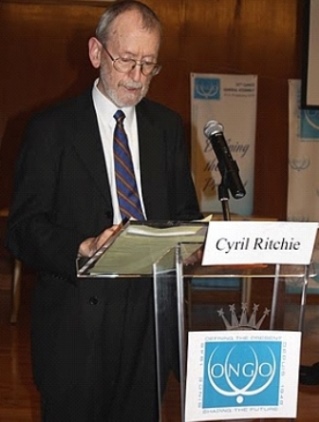 |
by Cyril Ritchie, Vice President UIA, President of CoNGO (the Conference of UN NGOs)
Relevance to the world. Why is the UN's 70th Anniversary in 2015 of particular relevance to the world of Non-governmental Organizations (NGOs) and Civil Society Organizations (CSOs)? Here are some considerations.
A. Thousands of NGOs/CSOs have a consultative, operational or other working relationship with one or more parts of the United Nations System worldwide. These are international/regional/national NGOs/CSOs of all sizes, and spread throughout all continents.
B. It is manifest that the United Nations System (all 50+ agencies, secretariats, programs, departments, commissions, forums...) should be the prime location for intelligent, knowledge-based, rational and future-oriented intergovernmental debate and decision-making, to respond to - and where possible resolve - the complex issues and needs of our interconnected planet.
Competent and responsible NGO/CSO input to intergovernmental debate and decision-making is a major factor in enhancing competent and responsible government output.
C. The strength and relevance of NGOs/CSOs derive from their extraordinary diversity. They are "front-line soldiers" in both advocacy and grass-roots cooperation with the United Nations System. NGOs/CSOs cover innumerable concerns: sustainable development, migration, indigenous peoples, ageing, status of women, disarmament and peace, freedom of association and assembly, promotion of democracy, human rights, financing for development, mental health, the family, narcotic drugs, volunteerism, and more.
Many NGOs/CSOs are currently deeply engaged in promoting the UN Post-2015 Agenda, generating expanded knowledge of, and access to, all levels of this complex, challenging and unifying process.
D. In society, NGOs/CSOs give voice to and advocate on behalf of citizens and their interests. NGOs and CSOs are, after all, nothing more - and nothing less – than groupings of citizens who have self-organized to promote a good cause (poverty eradication, access to justice, widening the information society, health for all, humanitarian relief etc) or to combat a bad one (trafficking in human beings, pollution of the oceans, child soldiers, violence against women, nuclear proliferation etc.).
They work with and through United Nations Conferences, Summits, organs and legal instruments. The moral and ethical "power" of NGOs/CSOs knows no limits, so one must be gravely concerned at the increasing number of examples throughout the world of regressive government action to limit, constrain, cast a slur on, or even disband or "outlaw" legitimate NGOs and CSOs. NGOs/CSOs have an essential role in society as responsible actors for democracy, human rights and the rule of law.
As key elements of participatory democracy, NGOs/CSOs are complementary to institutions of representative democracy. NGOs/CSOs themselves are representative of the long-term causes they promote, and need no authorization or condescension from transitory governments.
E. The United Nations System has been, and can be even more, a positive force in
- connecting, strengthening and scaling local and regional civil society networks, in the context of international advocacy and action
- connecting diverse communities: universities, foundations, associations, institutes, research centres, federations, alliances, scientific and technical bodies, and naturally grass-roots and other activist organizations
- addressing/harnessing/encouraging NGOs/CSOs to promote imagination and innovation in confronting the world's problems, progressively adapting both civil society AND United Nations modalities and practices
- facilitating NGO/CSO advocacy campaigns around global issues that are - or should be - addressed by intergovernmental structures, for example disarmament, population, social development, environment, ageing, social justice, human settlements, women's empowerment, sexual and reproductive rights, and many more...
F. Every one of the topics mentioned above can be, and should be, brought to the forefront of international dialogue throughout the UN's 70th Anniversary Year. The Anniversary is an occasion to underline the fundamental synergy between UN VALUES and NGO/CSO ETHICS, and to focus on TOGETHER preparing the world to be a better place for future generations.
To that end, let us deliberately and enthusiastically cooperate throughout the UN's 70th Anniversary!